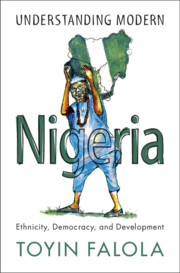Book contents
- Understanding Modern Nigeria
- Understanding Modern Nigeria
- Copyright page
- Dedication
- Contents
- Figures
- Maps
- Preface
- Acknowledgments
- Part I Introduction
- 1 Narrating Postcolonial Nigeria
- 2 In Search of Modernity
- Part II Context and History
- Part III Democracy and Governance
- Part IV Development Crises
- Part V Reforms and Revolutions
- Part VI Conclusion
- Bibliography
- Index
2 - In Search of Modernity
from Part I - Introduction
Published online by Cambridge University Press: 09 June 2021
- Understanding Modern Nigeria
- Understanding Modern Nigeria
- Copyright page
- Dedication
- Contents
- Figures
- Maps
- Preface
- Acknowledgments
- Part I Introduction
- 1 Narrating Postcolonial Nigeria
- 2 In Search of Modernity
- Part II Context and History
- Part III Democracy and Governance
- Part IV Development Crises
- Part V Reforms and Revolutions
- Part VI Conclusion
- Bibliography
- Index
Summary
“In Search of Modernity” delves into the history, issues, and future modalities of Nigeria surviving or emerging within a global discourse of modernity. It presents the ‘modern’ invention of Nigeria as a nation-state as a formation of Eurocentric modernity and the aftermath of industrialization. This argument is supported by pervasive levels of underdevelopment that ravage many African nations, affecting some of the fundamental features associated with modernity, but the European brand of modernity is obsolete. Nigeria, and much of the globalized world along with it, has evolved. Hence, there is a clamoring to either decolonize the present shape of modernity or evolve a more suitable one, as Eurocentric modernity has proven time without number not only to disregard the essentialities (religion, culture, etc.) that may help to define the peculiarities of Nigeria as a sovereign state, but has also perpetually pulled the nation down into further underdevelopment. Therefore, modernization is projected as a process, and modernity as an ongoing state. A nation can continually be in search of modernity while remaining modern, redefining its modern status, and localizing global features. By globalizing its contributions, modernity can self-inflect, be reflexive, and thrive in continuity.
- Type
- Chapter
- Information
- Understanding Modern NigeriaEthnicity, Democracy, and Development, pp. 29 - 44Publisher: Cambridge University PressPrint publication year: 2021

